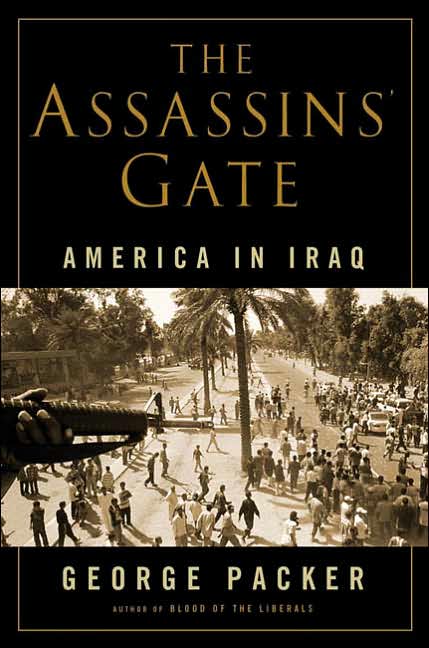 Download PDF of this full issue: v36n1.pdf (6.8 MB) Download PDF of this full issue: v36n1.pdf (6.8 MB) |
Neocon Architects of War
By Ken Nielsen (reviewer)
[Printer-Friendly Version]
The Assassin's Gate:America in Iraq
By George Packer
(Farrar, Straus and Giroux, 2005)
Sometimes referred to as a liberal hawk, George Packer has put together a wealth of information in The Assassin's Gate: America in Iraq, which at times comes close to attempting to justify the war. Although this is no small issue to overlook, the book does a good job of probing into the history and probable causes of the conflict, and it provides an engaging perspective from firsthand accounts of how things have changed since the initial invasion of Iraq.
Culled from a series of articles written for the New Yorker, Assassin's Gate is not a scholarly analysis of the war, but more of an educated treatise with a series of accounts and interviews that describe to the reader one reporter's interpretation after numerous visits to Iraq over a period of two years. In contrast to many authors writing about controversial subjects, Packer doesn't attempt to force the reader to conform to one idea or another, but instead explores facts and presents personal accounts of Iraqi citizens and exiles, American soldiers, and "occupational authority" civilians (including his own as a journalist in-country). For the most part, he lets the facts speak for themselves.
Unlike most critiques of our current administration's failures, instead of focusing on Bush, Rumsfeld, and Cheney, Packer goes straight to the brains of the influential neoconservative warmongers at the time and focuses on Feith, Pearle, and especially Paul Wolfowitz. He steps back to look at Wolfowitz's family history, philosophical and ideological roots, and what Wolfowitz considered an unfinished first Gulf War; this background sets the stage for the mess that is described throughout the remainder of the book.
While Packer doesn't present any information that is new to those who have been critically following the war in Iraq, Assassin's Gate does a great job of explaining the neoconservative role and background concerning Iraq, explaining the influence and misguidance of Iraqi exiles on the invasion, showing how the war was mismanaged from the highest levels, and showing the disastrous effect of bureaucratic infighting and institutional incompetence on the Iraqi people and the soldiers on the ground.
Unfortunately, the final analysis presented in the last chapter of Assassin's Gate is essentially that if the war in Iraq had been conducted differently, it would have been successful. In taking this stance, Packer falls into the same high-minded destructive approach to the Iraq War as its arrogant neoconservative architects. What George Packer doesn't seem to understand is that no war in which human beings are killed, maimed, or psychologically damaged can be considered successful, regardless of the outcome or cause.
Ken Nielsen served in the US Army from 1991 to 1993 (4th Battalion, 9th Infantry, 1st Division). He is a member of the Chicago chapter of VVAW.
|



